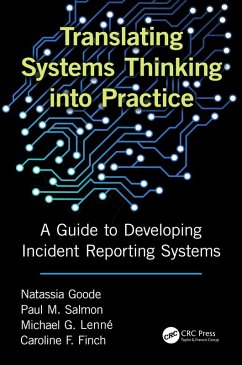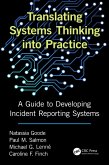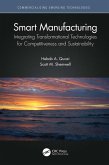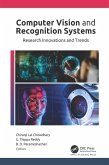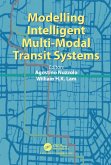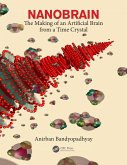Natassia Goode, Paul M. Salmon, Michael Lenne, Caroline Finch
Translating Systems Thinking into Practice (eBook, PDF)
A Guide to Developing Incident Reporting Systems
139,95 €
139,95 €
inkl. MwSt.
Sofort per Download lieferbar

70 °P sammeln
139,95 €
Als Download kaufen

139,95 €
inkl. MwSt.
Sofort per Download lieferbar

70 °P sammeln
Jetzt verschenken
Alle Infos zum eBook verschenken
139,95 €
inkl. MwSt.
Sofort per Download lieferbar
Alle Infos zum eBook verschenken

70 °P sammeln
Natassia Goode, Paul M. Salmon, Michael Lenne, Caroline Finch
Translating Systems Thinking into Practice (eBook, PDF)
A Guide to Developing Incident Reporting Systems
- Format: PDF
- Merkliste
- Auf die Merkliste
- Bewerten Bewerten
- Teilen
- Produkt teilen
- Produkterinnerung
- Produkterinnerung

Bitte loggen Sie sich zunächst in Ihr Kundenkonto ein oder registrieren Sie sich bei
bücher.de, um das eBook-Abo tolino select nutzen zu können.
Hier können Sie sich einloggen
Hier können Sie sich einloggen
Sie sind bereits eingeloggt. Klicken Sie auf 2. tolino select Abo, um fortzufahren.

Bitte loggen Sie sich zunächst in Ihr Kundenkonto ein oder registrieren Sie sich bei bücher.de, um das eBook-Abo tolino select nutzen zu können.
The book describes how to formally evaluate incident reporting systems to determine whether they meet these requirements.
- Geräte: PC
- mit Kopierschutz
- eBook Hilfe
- Größe: 12.38MB
Andere Kunden interessierten sich auch für
![Translating Systems Thinking into Practice (eBook, ePUB) Translating Systems Thinking into Practice (eBook, ePUB)]() Natassia GoodeTranslating Systems Thinking into Practice (eBook, ePUB)139,95 €
Natassia GoodeTranslating Systems Thinking into Practice (eBook, ePUB)139,95 €![Industry 4.0 and Climate Change (eBook, PDF) Industry 4.0 and Climate Change (eBook, PDF)]() Industry 4.0 and Climate Change (eBook, PDF)52,95 €
Industry 4.0 and Climate Change (eBook, PDF)52,95 €![Intelligent Infrastructure (eBook, PDF) Intelligent Infrastructure (eBook, PDF)]() Nastaran DadashiIntelligent Infrastructure (eBook, PDF)80,95 €
Nastaran DadashiIntelligent Infrastructure (eBook, PDF)80,95 €![Smart Manufacturing (eBook, PDF) Smart Manufacturing (eBook, PDF)]() Hebab A. QuaziSmart Manufacturing (eBook, PDF)48,95 €
Hebab A. QuaziSmart Manufacturing (eBook, PDF)48,95 €![Computer Vision and Recognition Systems (eBook, PDF) Computer Vision and Recognition Systems (eBook, PDF)]() Chiranji Lal ChowdharyComputer Vision and Recognition Systems (eBook, PDF)120,95 €
Chiranji Lal ChowdharyComputer Vision and Recognition Systems (eBook, PDF)120,95 €![Modelling Intelligent Multi-Modal Transit Systems (eBook, PDF) Modelling Intelligent Multi-Modal Transit Systems (eBook, PDF)]() Modelling Intelligent Multi-Modal Transit Systems (eBook, PDF)47,95 €
Modelling Intelligent Multi-Modal Transit Systems (eBook, PDF)47,95 €![Nanobrain (eBook, PDF) Nanobrain (eBook, PDF)]() Anirban BandyopadhyayNanobrain (eBook, PDF)114,95 €
Anirban BandyopadhyayNanobrain (eBook, PDF)114,95 €-
-
-
The book describes how to formally evaluate incident reporting systems to determine whether they meet these requirements.
Dieser Download kann aus rechtlichen Gründen nur mit Rechnungsadresse in A, B, BG, CY, CZ, D, DK, EW, E, FIN, F, GR, HR, H, IRL, I, LT, L, LR, M, NL, PL, P, R, S, SLO, SK ausgeliefert werden.
Produktdetails
- Produktdetails
- Verlag: Taylor & Francis
- Seitenzahl: 308
- Erscheinungstermin: 21. September 2018
- Englisch
- ISBN-13: 9781317172482
- Artikelnr.: 54110809
- Verlag: Taylor & Francis
- Seitenzahl: 308
- Erscheinungstermin: 21. September 2018
- Englisch
- ISBN-13: 9781317172482
- Artikelnr.: 54110809
- Herstellerkennzeichnung Die Herstellerinformationen sind derzeit nicht verfügbar.
Natassia Goode is a Research Fellow within the Centre for Human and Sociotechnical Systems at the University of the Sunshine Coast. Dr. Goode currently holds an Advance Queensland Research Fellowship focused on applying systems thinking methods in healthcare. Her PhD and honours research in psychology investigated how people learn about complex systems. Since then, her research has focused on applying systems thinking to optimize the way that organizations manage safety. She has co-authored over 45 peer-reviewed journal articles, and numerous conference contributions and industry reports.
Paul M. Salmon is a Professor in Human Factors and the creator and director of the Centre for Human Factors and Sociotechnical Systems (www.hf-sts.com) at the University of the Sunshine Coast. Professor Salmon currently holds an Australian Research Council Future Fellowship in transport safety. He has a 17-year track record of applied Human Factors research in areas such as road and rail safety, aviation, defence, sport and outdoor recreation, healthcare, workplace safety, land use and urban planning, and cybersecurity. His research has focused on understanding and optimizing human, team, organizational, and system performance through the application of Human Factors theory and methods. He has co-authored 14 books, over 180 peer-reviewed journal articles, and numerous book chapters and conference contributions. He has received many awards and accolades for his research and, in 2016, was awarded the Human Factors and Ergonomics Society Australia's Cumming Memorial Medal for his contribution to Human Factors research and practice.
Michael G. Lenné is an Adjunct Professor (research) at the Monash University Accident Research Centre (MUARC), Victoria, Australia. He obtained a PhD in human factors psychology in 1998 and has since served in a number of research roles in university and government settings. His most recent academic position was Professor in Human Factors at MUARC, where his research program used simulation and instrumented vehicles to study the impacts of vehicle design, technology, and road design on behavior and safety. Professor Lenné's research is widely disseminated, with over 120 journal publications, 5 books, and over 200 reports that provide practical recommendations. He has been the guest editor for three journal special issues since 2014, and served on the editorial boards of the field's leading journals. In 2014, he transitioned into a scientific role with a primary focus on the development of research partnerships that directly support the development of technology to improve transport safety. He maintains academic collaborations through his adjunct role at MUARC, including the flagship Enhanced Crash Investigation Study.
Caroline F. Finch is the Deputy Vice-Chancellor (Research) at the Edith Cowan University in Perth, Australia. Prior to this current role, she held a Robert HT Smith Personal Chair in Sports Safety at Federation University Australia, in Ballarat where she was also supported by a National Health and Medical Research Council Principal Research Fellowship. Since 2010, she has been the Director of the Australian Centre for Research into Injury in Sport and its Prevention (ACRISP), an IOC recognized centre focusing on research in injury prevention and the promotion of health in athletes. Professor Finch is a highly accomplished academic and world-renown researcher. She is the author of over 700 research-related publications, and has earned more than $22 million in research funding over the course of her career. She is known globally for her injury prevention, injury surveillance, and sports medicine research. She has previously been ranked as one of the 10 most highly published injury researchers of all time and is recognized as one of the most influential sports medicine researchers internationally. In 2015, she was awarded the American Public Health Association Distinguished International Career Award from the Injury Control and Emergency Health Services Section. In 2018, Professor Finch was appointed as an Officer of the Order of Australia (AO) for her distinguished service to sports medicine, particularly in the area of injury prevention as an educator, researcher, and author, and to the promotion of improved health in athletes and those who exercise.
Paul M. Salmon is a Professor in Human Factors and the creator and director of the Centre for Human Factors and Sociotechnical Systems (www.hf-sts.com) at the University of the Sunshine Coast. Professor Salmon currently holds an Australian Research Council Future Fellowship in transport safety. He has a 17-year track record of applied Human Factors research in areas such as road and rail safety, aviation, defence, sport and outdoor recreation, healthcare, workplace safety, land use and urban planning, and cybersecurity. His research has focused on understanding and optimizing human, team, organizational, and system performance through the application of Human Factors theory and methods. He has co-authored 14 books, over 180 peer-reviewed journal articles, and numerous book chapters and conference contributions. He has received many awards and accolades for his research and, in 2016, was awarded the Human Factors and Ergonomics Society Australia's Cumming Memorial Medal for his contribution to Human Factors research and practice.
Michael G. Lenné is an Adjunct Professor (research) at the Monash University Accident Research Centre (MUARC), Victoria, Australia. He obtained a PhD in human factors psychology in 1998 and has since served in a number of research roles in university and government settings. His most recent academic position was Professor in Human Factors at MUARC, where his research program used simulation and instrumented vehicles to study the impacts of vehicle design, technology, and road design on behavior and safety. Professor Lenné's research is widely disseminated, with over 120 journal publications, 5 books, and over 200 reports that provide practical recommendations. He has been the guest editor for three journal special issues since 2014, and served on the editorial boards of the field's leading journals. In 2014, he transitioned into a scientific role with a primary focus on the development of research partnerships that directly support the development of technology to improve transport safety. He maintains academic collaborations through his adjunct role at MUARC, including the flagship Enhanced Crash Investigation Study.
Caroline F. Finch is the Deputy Vice-Chancellor (Research) at the Edith Cowan University in Perth, Australia. Prior to this current role, she held a Robert HT Smith Personal Chair in Sports Safety at Federation University Australia, in Ballarat where she was also supported by a National Health and Medical Research Council Principal Research Fellowship. Since 2010, she has been the Director of the Australian Centre for Research into Injury in Sport and its Prevention (ACRISP), an IOC recognized centre focusing on research in injury prevention and the promotion of health in athletes. Professor Finch is a highly accomplished academic and world-renown researcher. She is the author of over 700 research-related publications, and has earned more than $22 million in research funding over the course of her career. She is known globally for her injury prevention, injury surveillance, and sports medicine research. She has previously been ranked as one of the 10 most highly published injury researchers of all time and is recognized as one of the most influential sports medicine researchers internationally. In 2015, she was awarded the American Public Health Association Distinguished International Career Award from the Injury Control and Emergency Health Services Section. In 2018, Professor Finch was appointed as an Officer of the Order of Australia (AO) for her distinguished service to sports medicine, particularly in the area of injury prevention as an educator, researcher, and author, and to the promotion of improved health in athletes and those who exercise.
1. Systems Thinking and Incident Causation. 2. Systems Thinking and
Incident Analysis. 3. A Process Model for Developing an Incident Reporting
System. 4. Understanding the Context. 5. Identifying the Needs and
Priorities of End Users. 6. Adapting Accimap for Use in an Incident
Reporting System. 7. Evaluating Reliability and Validity. 8. Designing a
Prototype Incident Reporting System. 9. Evaluating Usability. 10.
Evaluating Data Quality. 11. Outputs from the Development Process -
UPLOADS. 12. Analyzing Incident Data. 13. Designing Incident Prevention
Strategies. 14. Lessons Learned, Future Research Directions, and the
Incident Reporting Systems of Tomorrow. Appendix A. UPLOADS Contributing
Factor Classification Scheme. Appendix B. Examples of Coding Tasks for
Reliability and Validity Assessments. Appendix C. UPLOADS Incident Report
Form. Appendix D. Training Manual: The UPLOADS Approach to Accident
Analysis.
Incident Analysis. 3. A Process Model for Developing an Incident Reporting
System. 4. Understanding the Context. 5. Identifying the Needs and
Priorities of End Users. 6. Adapting Accimap for Use in an Incident
Reporting System. 7. Evaluating Reliability and Validity. 8. Designing a
Prototype Incident Reporting System. 9. Evaluating Usability. 10.
Evaluating Data Quality. 11. Outputs from the Development Process -
UPLOADS. 12. Analyzing Incident Data. 13. Designing Incident Prevention
Strategies. 14. Lessons Learned, Future Research Directions, and the
Incident Reporting Systems of Tomorrow. Appendix A. UPLOADS Contributing
Factor Classification Scheme. Appendix B. Examples of Coding Tasks for
Reliability and Validity Assessments. Appendix C. UPLOADS Incident Report
Form. Appendix D. Training Manual: The UPLOADS Approach to Accident
Analysis.
1. Systems Thinking and Incident Causation. 2. Systems Thinking and
Incident Analysis. 3. A Process Model for Developing an Incident Reporting
System. 4. Understanding the Context. 5. Identifying the Needs and
Priorities of End Users. 6. Adapting Accimap for Use in an Incident
Reporting System. 7. Evaluating Reliability and Validity. 8. Designing a
Prototype Incident Reporting System. 9. Evaluating Usability. 10.
Evaluating Data Quality. 11. Outputs from the Development Process -
UPLOADS. 12. Analyzing Incident Data. 13. Designing Incident Prevention
Strategies. 14. Lessons Learned, Future Research Directions, and the
Incident Reporting Systems of Tomorrow. Appendix A. UPLOADS Contributing
Factor Classification Scheme. Appendix B. Examples of Coding Tasks for
Reliability and Validity Assessments. Appendix C. UPLOADS Incident Report
Form. Appendix D. Training Manual: The UPLOADS Approach to Accident
Analysis.
Incident Analysis. 3. A Process Model for Developing an Incident Reporting
System. 4. Understanding the Context. 5. Identifying the Needs and
Priorities of End Users. 6. Adapting Accimap for Use in an Incident
Reporting System. 7. Evaluating Reliability and Validity. 8. Designing a
Prototype Incident Reporting System. 9. Evaluating Usability. 10.
Evaluating Data Quality. 11. Outputs from the Development Process -
UPLOADS. 12. Analyzing Incident Data. 13. Designing Incident Prevention
Strategies. 14. Lessons Learned, Future Research Directions, and the
Incident Reporting Systems of Tomorrow. Appendix A. UPLOADS Contributing
Factor Classification Scheme. Appendix B. Examples of Coding Tasks for
Reliability and Validity Assessments. Appendix C. UPLOADS Incident Report
Form. Appendix D. Training Manual: The UPLOADS Approach to Accident
Analysis.
